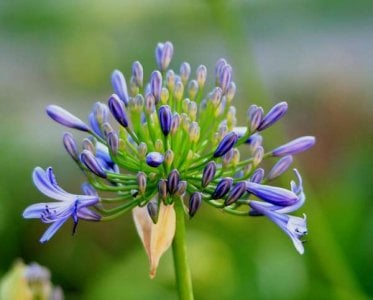Is this ‘pretty’ flower taking over your yard? Here's what you need to know!
By
Danielle F.
- Replies 13
As green thumbs, we deeply appreciate the beauty and diversity of our flora.
Our backyards are often a source of pride, a place for relaxation, and a haven for local wildlife.
However, a 'pretty' intruder might be deceiving you with its charming looks while silently wreaking havoc on our native ecosystem.
The Agapanthus, also known as the African lily or Lily of the Nile, is a South African perennial gracing Aussie gardens since the 1970s.
With its tall clusters of bell-shaped flowers, it's easy to see why it's become a popular choice for homeowners seeking low-maintenance landscaping.
However, beneath its attractive façade lies a threat to our environment.
These plants have been labelled as environmental weeds due to their ability to spread rapidly and dominate gardens, native bushland, and roadside areas.
In New South Wales, Victoria, Tasmania, South Australia, and Western Australia, Agapanthus are not just crowding out native species but are also poisonous, posing a risk to native fauna.
Steven from horticultural blog Zani’s Gardening recently highlighted the Agapanthus on social media.
He described Agapanthus as ‘invasive to the Mornington Peninsula and the Dandenong Ranges' outside Melbourne.
‘As you can see Agapanthus can spread out and clump up really easily. Now they spread when the pretty flower that a lot of people like seeds and self reproduces.’ he shared.
‘They can often reproduce through roots on the ground and just completely take over an area.’
Steven, who has extensive experience working in nurseries, advocates for the removal of invasive plants and the incorporation of native species into our gardens.
‘A good garden should include a few natives as part of the design to accommodate for this. Also keep in mind the growth habits of other plants,’ he said.
‘You want to read the label and have a good understanding that what you purchase will suit the fauna/birds and not grow [big enough] to destroy and take over a certain area.’
Moreover, he suggests that having a garden with native plants could potentially increase property value, as invasive species can be costly to remove.
If you find Agapanthus in your garden and decide to take action, he recommended using a herbicide like glyphosate to spray the plant until it breaks down naturally.
This method is more effective than trying to dig them out, as their roots are vigorous and deep.
The Wingecarribee Shire Council in the Southern Highlands of NSW has also issued advice on how to manage Agapanthus.
They suggested ‘deadheading’ the plants, which involves removing the spent flower heads before they develop into seeds, typically between December and March.
However, it's crucial not to dispose of the cuttings in a regular green compost bin.
‘Agapanthus seeds are incredibly persistent, resilient, and they can survive in soil for years, even in mulch piles,’ Wingecarribee Shire Council’s General Manager Lisa Miscamble shared.
Instead, they should be placed in the green garden organics bin to ensure proper decomposition and prevent further spread.
Through planting native species and managing invasive ones responsibly, we can all contribute to preserving the unique beauty of our homes and keeping our flora and fauna safe from any harm.
Watch Steven’s video here:
Source: Zani's Gardening/TikTok

Have you noticed them taking over areas in your garden or local environment? What steps have you taken to manage them? Share your stories and tips in the comments below.
Our backyards are often a source of pride, a place for relaxation, and a haven for local wildlife.
However, a 'pretty' intruder might be deceiving you with its charming looks while silently wreaking havoc on our native ecosystem.
The Agapanthus, also known as the African lily or Lily of the Nile, is a South African perennial gracing Aussie gardens since the 1970s.
With its tall clusters of bell-shaped flowers, it's easy to see why it's become a popular choice for homeowners seeking low-maintenance landscaping.
However, beneath its attractive façade lies a threat to our environment.
These plants have been labelled as environmental weeds due to their ability to spread rapidly and dominate gardens, native bushland, and roadside areas.
In New South Wales, Victoria, Tasmania, South Australia, and Western Australia, Agapanthus are not just crowding out native species but are also poisonous, posing a risk to native fauna.
Steven from horticultural blog Zani’s Gardening recently highlighted the Agapanthus on social media.
He described Agapanthus as ‘invasive to the Mornington Peninsula and the Dandenong Ranges' outside Melbourne.
‘As you can see Agapanthus can spread out and clump up really easily. Now they spread when the pretty flower that a lot of people like seeds and self reproduces.’ he shared.
‘They can often reproduce through roots on the ground and just completely take over an area.’
Steven, who has extensive experience working in nurseries, advocates for the removal of invasive plants and the incorporation of native species into our gardens.
‘A good garden should include a few natives as part of the design to accommodate for this. Also keep in mind the growth habits of other plants,’ he said.
‘You want to read the label and have a good understanding that what you purchase will suit the fauna/birds and not grow [big enough] to destroy and take over a certain area.’
Moreover, he suggests that having a garden with native plants could potentially increase property value, as invasive species can be costly to remove.
If you find Agapanthus in your garden and decide to take action, he recommended using a herbicide like glyphosate to spray the plant until it breaks down naturally.
This method is more effective than trying to dig them out, as their roots are vigorous and deep.
The Wingecarribee Shire Council in the Southern Highlands of NSW has also issued advice on how to manage Agapanthus.
They suggested ‘deadheading’ the plants, which involves removing the spent flower heads before they develop into seeds, typically between December and March.
However, it's crucial not to dispose of the cuttings in a regular green compost bin.
‘Agapanthus seeds are incredibly persistent, resilient, and they can survive in soil for years, even in mulch piles,’ Wingecarribee Shire Council’s General Manager Lisa Miscamble shared.
Instead, they should be placed in the green garden organics bin to ensure proper decomposition and prevent further spread.
Through planting native species and managing invasive ones responsibly, we can all contribute to preserving the unique beauty of our homes and keeping our flora and fauna safe from any harm.
Watch Steven’s video here:
Source: Zani's Gardening/TikTok
Key Takeaways
- Agapanthus, a South African plant introduced to Australia, is becoming an environmental weed harmful to local ecosystems.
- This plant spreads quickly, self-reproduces through seeds and roots, and is particularly invasive in areas like the Mornington Peninsula and the Dandenong Ranges.
- Horticulturist Steven from Zani’s Gardening encourages Aussies to replace invasive plants like Agapanthus with native ones to enhance sustainability and attract wildlife.
- Effective removal of Agapanthus involves using herbicides such as glyphosate and careful disposal of seeds through 'deadheading' to prevent further spreading.
Last edited:









